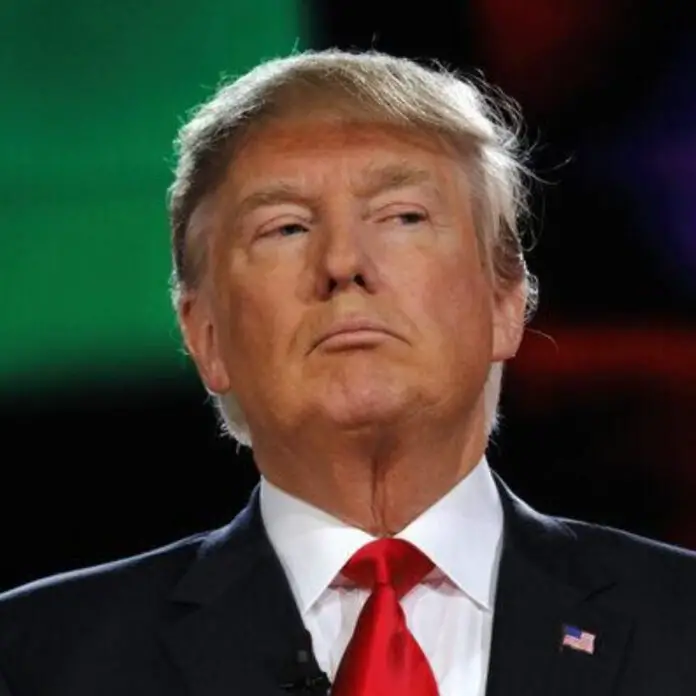President Donald Trump is under scrutiny following remarks made about Swiss Confederation President Karin Keller-Sutter during a phone interview with CNBC on Tuesday morning, August 5. Trump incorrectly referred to Keller-Sutter as the prime minister and described her as “the woman.”
In the interview, Trump addressed trade tariff discussions with the European Union and Switzerland. He mentioned reducing tariffs on the EU from 30% to 15%, while threatening to increase them to 35% if the EU did not fulfill its commitment to provide the United States with $600 billion for investment, clarifying this was not a loan and that he could do “anything I want with it.”
Trump then discussed Switzerland, mistakenly identifying it as part of the EU. “I spoke to their prime minister. The woman was nice, but she didn’t want to listen,” Trump said, referring to President Keller-Sutter.
Karin Keller-Sutter holds the position of president of the Swiss Confederation, which operates with a Federal Council of seven members. Switzerland does not have a prime minister. Keller-Sutter, a Liberal Party member, has been president since 2025 and previously served on the Federal Council since 2019, overseeing the Federal Department of Finance.
During the call, Trump expressed dissatisfaction with Switzerland’s tariff policies. He claimed the country paid “essentially no tariffs” and mentioned telling Keller-Sutter that the United States had a $41 billion deficit with Switzerland, insisting the nation could not continue with just 1% tariffs.
However, official data indicates the U.S. trade deficit with Switzerland in goods was $38.3 billion in 2024, a 56.1% increase from $13.8 billion the previous year. The U.S. also holds a $29.7 billion surplus in services trade with Switzerland, which Trump’s figure does not include.
The phone conversation Trump mentioned took place on July 31 and has been characterized as “disastrous” by several sources familiar with the matter. Swiss officials thought they were close to securing a 10% tariff rate, akin to deals with other nations. Instead, Trump declared a 39% tariff on Swiss goods, among the highest worldwide.
The unexpected tariff decision surprised Swiss negotiators who believed they had reached a preliminary agreement with U.S. Trade Representative Jamieson Greer and Treasury Secretary Scott Bessent. According to Swiss officials, Switzerland had offered nearly $150 billion in U.S.-bound investment during negotiations.
Social media users criticized Trump’s language, particularly his reference to Keller-Sutter as “the woman.” One X user pointed out that she is not a prime minister but the president of the Swiss Confederation, questioning whether Trump should know this basic fact.
Following the tariff announcement, Swiss President Keller-Sutter and Economy Minister Guy Parmelin traveled to Washington, D.C., on August 5 for urgent discussions with the Trump administration. The hastily arranged trip aimed to secure a last-minute deal before the 39% tariffs were enacted on August 8.
The high tariffs are expected to significantly impact Switzerland’s export-driven economy. The 39% rate affects Swiss goods such as watches, chocolates, machinery, and medical equipment. However, Switzerland’s pharmaceutical sector, which constitutes 38.5% of the country’s exports, remains exempt from the tariffs for now.
Economists predict the tariffs could reduce Switzerland’s GDP by approximately 0.6% in the medium term if pharmaceutical products remain protected. However, Trump indicated in his CNBC interview that sector-specific tariffs on pharmaceuticals could rise to 250% within the next 18 months.
Swiss businesses have voiced concern about the unpredictability of negotiations with Trump. Ivan Slatkine, head of the Federation of Romandie Enterprises, noted the difficulty of negotiating with someone as unpredictable as the president. He said Swiss companies had been led to believe a deal was essentially complete and only awaited Trump’s signature.
The Swiss government has defended its trade practices, noting that the country unilaterally eliminated all industrial tariffs in 2024, meaning over 99% of U.S. goods enter Switzerland tariff-free. Switzerland also ranks as the sixth-biggest foreign investor in the United States and leads in research and development investment.
Much of the U.S. trade deficit with Switzerland stems from gold exports, which transit through the country for refining and trading purposes. Gold and pharmaceutical products are both exempt from Trump’s current tariff regime, leading to confusion in Swiss government circles about what additional concessions could be offered.
The delegation’s visit to Washington concluded without success, as Keller-Sutter was unable to secure a meeting with Trump before her departure. The 39% tariffs officially took effect on August 8, placing Switzerland among the countries facing the highest U.S. import duties, alongside Laos, Myanmar, and Syria.
Swiss media outlets have criticized Keller-Sutter’s handling of the negotiations, with some describing the failed talks as her biggest political defeat. The tabloid Blick called her approach “too naive,” while other publications questioned whether Switzerland’s diplomatic strategy was suited for dealing with Trump’s negotiating style.
The tariff dispute represents a significant challenge for Swiss-U.S. relations, as the United States serves as Switzerland’s top export market for goods. The Swiss government has indicated it will continue seeking a negotiated solution while exploring other options, including potential World Trade Organization complaints or retaliatory measures.

